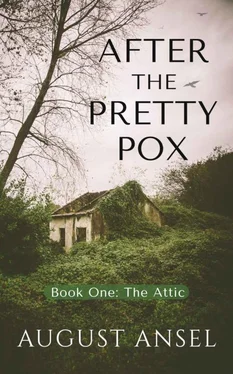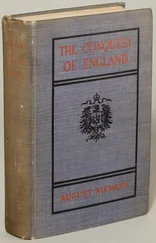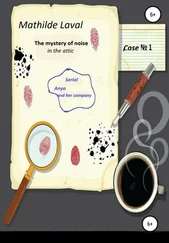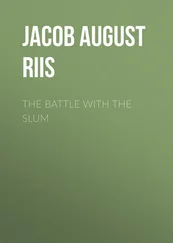They each took a whole chicken on a plate, and Arie dropped the chipped and dented dome lid of an old barbeque grill over the fire pit. At the sky panel she prepared to go down, but Handy put out an arm, blocking her. “I won’t stand by and let him hurt either of you,” he said. “If something goes badly, if there’s no time for discussion, I’ll kill him.”
“My life is—”
“Don’t say it.” He stared at her, their faces inches apart. “Your life is not only yours alone.” The dark scar on her inner arm, the null sign carved there years ago, was just visible at the edge of her sleeve. He tapped it briefly. If she hadn’t been holding the plate of meat, she would have jerked her arm away. “This doesn’t change it, Ariela. Your life is mine, too.”
She glared at him and swallowed a hundred retorts. “Here comes dinner,” she called into the attic.
The tincture and the promise of cooked chicken had brought the man around. His face was more swollen, the bruises darker, but when Arie and Handy got inside, bolting the sky panel behind them, he was sitting up, head erect, eyes open.
“How’s the pain?” Arie said. She put the steaming plates on the work table and lit a couple of candles.
“Feels…” His voice was a wooden croak. He coughed, eyes squeezed tight, made a small moan. “Feels like someone hit me in the head with a rock.”
“Just in the nick of time, too,” said Arie. She wiped the blade of her knife and cut the halves of one chicken into the familiar parts of long-gone suppers: thighs, drumsticks, wings, breast, and back. “Renna,” she said, “Handy’s going to help you walk over here for your meal.” The girl had already done more moving around in one day than Arie would have thought possible, but she was determined to push Renna to the limit of herself, so they could both learn where that limit was. “You, now,” she said to the man. “I suppose you’d like some of this.” She nodded at the food.
He squinted at her. When she said nothing, he must have decided she meant it. “Yes.”
“Attacking innocent people whetted your appetite, did it?” she said.
Renna had made it to the table, leaning on Handy’s arm. She shot a look of contempt at the man, but to Arie’s relief she kept her mouth shut.
“I didn’t intend to—” His mouth opened and closed it again, flailing to explain. “It wasn’t meant to be an attack,” he said.
“Funny, it sure looked like an attack when I got here,” said Handy. He was helping Renna settle herself back on the sofa. He closed the distance in two strides and squatted in front of the man, eye to eye. “I looked in from up there and saw two women tied up, one with blood on her, and you with a spear.” He straightened. “That’s just your way of getting to know a neighbor, I guess.” He helped himself to an entire roasted half-bird. He took a tremendous bite from the breast and made a little sigh of pleasure before sitting down by Renna, who was already gnawing on the gristled knob at the end of the drumstick. Handy pulled the drumstick off his own portion and put it on her plate. She smiled at him and kept eating.
Arie watched their captive a minute. He sat still, looking at his own feet. “I’ve earned my daily bread,” she told him, “and I mean to have it. You, though.” She took up the back piece, not bothering with a plate. “You’re going to have to barter for your supper.” She pulled loose the tail, plump and brown, and laughed. “My favorite,” she said, holding it up to admire. “Our grandfather taught me to love this bit,” she said to Handy. When she bit through the browned skin, the yielding fat and bits of meat melted in her mouth. Unexpectedly, her eyes stung with tears. She turned slightly so the man would not see this. “Pop always pulled the tail off a roasted chicken, or the turkey at Thanksgiving, just as soon as Granny put it on the table.” She glanced at Handy, who was busily creating a little pile of chicken bones. “Do you know Thanksgiving?” she asked.
Renna looked up as if Arie were dimwitted. “Of course I do.” She picked up the leg bone again, snapped it neatly in two and began picking at the marrow inside.
“I was asking Handy,” said Arie. “We weren’t raised to celebrate it.”
“I know Thanksgiving,” he said. “We went into town often enough.” He wiped his mouth with his forearm. “I went with Morgan once when I was, oh, maybe eight or nine, and we had to pick up rice and oats and some other stuff from Nilsen’s. When we drove past the school, the little kids’ school by the bridge, there were all these turkey drawings put up in the windows. I couldn’t figure that out,” he said.
Arie snuck a glance at the intruder. He had stopped staring at his feet and was watching Handy, who ate while he talked. The man sat completely still, but Arie saw him, just once, lick his lips when Handy took a bite of food.
“I made those,” said Renna. She held up a greasy hand, palm open and fingers splayed. “First you traced the head.” She touched her thumb. “Then you traced the feathers.” She touched each finger. “After that, you colored it. A turkey.”
“I didn’t know that, though,” said Handy. “We ate a turkey sometimes, but we didn’t make a holiday for it. That day when we pulled into the parking lot at Nilsen’s, I asked Morgan if the school was a store where people got their chickens. He looked at me like I was daft.”
Renna laughed. “No Thanksgiving,” she said, shaking her head. “That’s too bad.”
Handy shrugged and kept eating, but he was clearly pleased at her attention.
“What Grandpa always said,” said Arie, “when he pulled off the tail and put it on his plate was, ‘That’s for me. The pope’s nose.’ It was the sort of thing people weren’t supposed to say back then, but he’d learned it from his own father, and it stuck, I guess. I didn’t know for the longest time what he could mean by that—the pope’s nose.” She snorted. “What did I know of a pope? Or of the Catholic Church, or even of Rome, for that matter. Do you know Rome, William?”
He didn’t look at her. “I don’t imagine it matters now,” he said, “if I can’t walk there.”
Arie wiped her hands on her apron. The meat was warm in her belly, and the perfectly familiar taste of it gave her an odd contentment. She dropped the bones into a small cook pot to make broth with later and placed a meaty thigh on a pocked and creased metal pie plate. Marie Callender’s was embossed across the discolored bottom. She approached the man. “There’s some talk that has to happen,” she said.
His eyes went from her face to the plate in her hands. “Fair enough,” he said.
“What’s fair might have been to cut your throat and throw you in the woods to make a meal for something with fur or feathers.” She nodded at the meat she held. “Mought be it’s only a fair trade, eh? We eat them, after all.”
He held his peace.
“I’m not promising you won’t end up on the menu, understand.” She smiled. “Not our menu. We’ve not sunk to that depravity. But there is a world of appetite that would be delighted to have you. Meantime, though, I’m going to give you this plate, and in exchange I expect you to answer my questions. Are we clear?”
“Yes.”
“I’m likely to know a lie,” she said. “I have an eye for faces. Always have.” This was true. Of course, she hadn’t had the chance to read many faces in the past two years, but he didn’t know it, nor would he likely believe her anyway. She put the plate of chicken in his lap.
He picked it up, awkward with his hands tied, and managed to grab hold with his long fingers and get it to his mouth. He took such a massive bite that she could hear the crunch of bone between his teeth. It obviously pained him to chew, but he kept at it that way, making small grunting sounds as he ate.
Читать дальше













